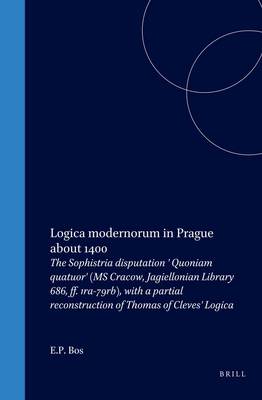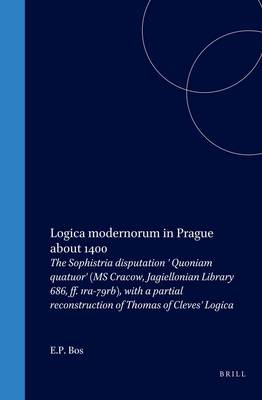
- Afhalen na 1 uur in een winkel met voorraad
- Gratis thuislevering in België vanaf € 30
- Ruim aanbod met 7 miljoen producten
- Afhalen na 1 uur in een winkel met voorraad
- Gratis thuislevering in België vanaf € 30
- Ruim aanbod met 7 miljoen producten
Zoeken
Logica Modernorum in Prague about 1400
The Sophistria Disputation 'Quoniam Quatuor' (MS Cracow, Jagiellonian Library 686, Ff. 1ra-79rb), with a Partial Reconstruction of Thomas of Cleves' Logica
E P Bos
€ 380,45
+ 760 punten
Omschrijving
An anonymous tract is preserved in Cracow, "Jagiellonian Library" 686, ff. 1ra - 79rb. The tract is a specimen of the art of "sophistria," It is intended to help students avoid problems concerning fallacies and ambiguities of words. The tract originates from Prague. It was written around 1400. The manuscript was brought to Cracow. The "contents" are primarily the logical and semantic topics also found in textbooks by Peter of Spain, Marsilius of Inghen, Thomas Manlevelt, Thomas of Cleves and Richard Billingham. The main topics are: "sophistria" as a science; signification; syncategorematic terms; supposition; ampliation, restriction; complex signifiables, the significate of a proposition; mediate and immediate, resolvable, exponible and functionalizable terms; propositions with a term in the comparative or superlative form; exceptive, exclusive and reduplicative propositions. Apart from the presentation of sometimes original views, one of the results of this edition is the partial reconstruction of the "Logica" by a master "Thomas of Cleves," This "Logica" has not been preserved elsewhere. Our "sophistria" is also worth study as a testimony of the use made around 1400 of the works of Richard Billingham who wrote an influential "Speculum puerorum," Billingham is especially interested to test propositions by individual things in reality. This logical handbook was a kind of successor and alternative to Peter of Spain's "Tractatus,"
Specificaties
Betrokkenen
- Auteur(s):
- Uitgeverij:
Inhoud
- Aantal bladzijden:
- 488
- Taal:
- Engels
- Reeks:
- Reeksnummer:
- nr. 82
Eigenschappen
- Productcode (EAN):
- 9789004140097
- Verschijningsdatum:
- 30/08/2004
- Uitvoering:
- Hardcover
- Formaat:
- Genaaid
- Afmetingen:
- 168 mm x 244 mm
- Gewicht:
- 1016 g

Alleen bij Standaard Boekhandel
+ 760 punten op je klantenkaart van Standaard Boekhandel
Beoordelingen
We publiceren alleen reviews die voldoen aan de voorwaarden voor reviews. Bekijk onze voorwaarden voor reviews.








